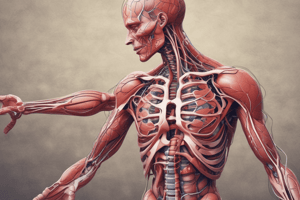Podcast
Questions and Answers
What is the function of hemoglobin in red blood cells?
What is the function of hemoglobin in red blood cells?
- To bind to oxygen forming oxyhemoglobin (correct)
- To transport carbon dioxide
- To produce antibodies
- To aid in blood clotting
Platelets are whole cells.
Platelets are whole cells.
False (B)
What is the primary function of white blood cells?
What is the primary function of white blood cells?
Producing antibodies and part of the immune system
The liquid component of blood that transports dissolved substances is called ____________________.
The liquid component of blood that transports dissolved substances is called ____________________.
Match the following components of blood with their functions:
Match the following components of blood with their functions:
What is a risk associated with blood transfusions?
What is a risk associated with blood transfusions?
What is the main difference between the circulatory system in fish and humans?
What is the main difference between the circulatory system in fish and humans?
The right ventricle pumps blood to the body.
The right ventricle pumps blood to the body.
What is the function of the vena cava?
What is the function of the vena cava?
The _______________________ artery carries blood to the lungs.
The _______________________ artery carries blood to the lungs.
Match the following blood vessels with their functions:
Match the following blood vessels with their functions:
What is the main function of the coronary arteries?
What is the main function of the coronary arteries?
Arteries have thin walls.
Arteries have thin walls.
What is the main function of capillaries?
What is the main function of capillaries?
Flashcards are hidden until you start studying
Study Notes
Circulation in Fish and Humans
- Fish have a single circulatory system, where deoxygenated blood is pumped from the heart to the gills, and then oxygenated blood passes from the gills to the organs.
- In contrast, humans have a double circulatory system, where deoxygenated blood is pumped from the heart to the lungs, and then oxygenated blood returns to the heart and is pumped to the organs.
Structure of the Heart
- The heart has four chambers: left and right atria (top) and left and right ventricles (bottom).
- Valves separate the atria from the ventricles.
- The left ventricle has a thicker wall than the right ventricle, as it pumps blood to the body.
Blood Vessels
- The vena cava brings deoxygenated blood to the heart.
- The pulmonary artery carries blood to the lungs.
- The pulmonary vein returns oxygenated blood to the heart.
- The aorta pumps blood to the body.
Blood Flow Pattern
- Blood enters the left and right atria, and then contracts to force blood into the ventricles.
- The ventricles contract to force blood out, with valves preventing backflow.
Coronary Arteries
- Coronary arteries branch from the aorta and supply oxygen to the heart muscle.
Pacemaker
- A group of cells in the right atrium controls the heart rate.
- An artificial pacemaker can correct irregular heart rates if necessary.
Blood Components
- Plasma is the liquid component of blood, transporting dissolved substances such as glucose, oxygen, and carbon dioxide.
Red Blood Cells
- Red blood cells transport oxygen from the lungs to body cells.
- They contain hemoglobin, which binds to oxygen forming oxyhemoglobin.
- They have a biconcave shape, increasing surface area for rapid oxygen diffusion.
White Blood Cells
- White blood cells are part of the immune system, producing antibodies.
- They contain a nucleus with DNA instructions for immune functions.
Platelets
- Platelets are fragments of cells that aid in blood clotting.
Uses and Risks of Blood Products
- Donated blood can replace blood lost during injury, and platelets from blood help in clotting.
- Proteins such as antibodies can be extracted for medical uses.
- However, there is a risk of infection from blood transfusion, and blood type must be matched to prevent immune rejection.
Studying That Suits You
Use AI to generate personalized quizzes and flashcards to suit your learning preferences.



